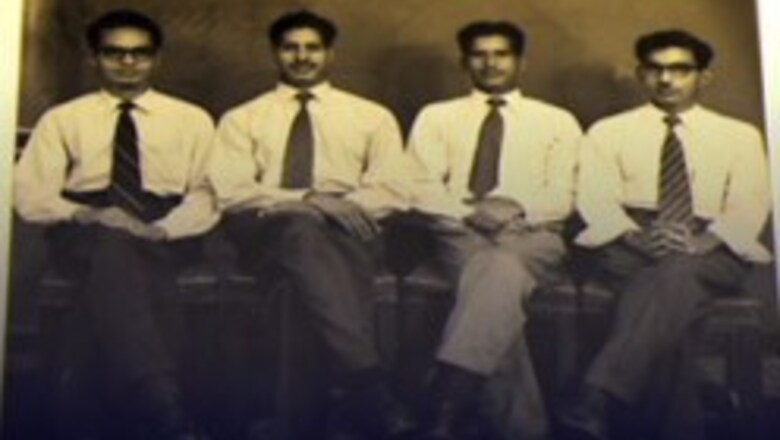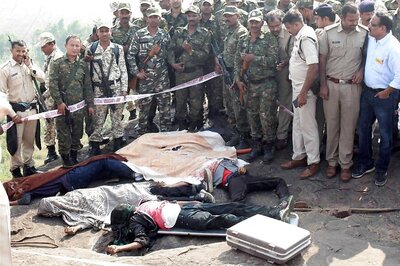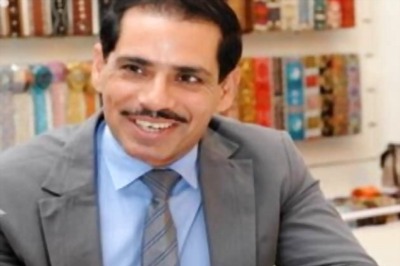
views
New Delhi: Missing in Action is a tribute to war heroes from both sides of a border. A border that binds as much as it divides. It is a tribute as well to families that have lost their dearest ones and at times, not even had the chance to say a final goodbye. Even as diplomatic relations between India and Pakistan go through a see-saw of frostiness and thaw, families have tried to find out whether the warrior who never returned is still alive or dead.
A PAF pilot's tale
On September 7, 1965 - day one of the Indo-Pak war - Squadron Leader Alam Siddiqui of the Pakistan Air Force said goodbye to his 21-year-old bride and took off from Karachi.
He flew into the enemy territory in his B-57 bomber, never to return again.
"The day he died, he came home to tell us the war had started. He asked my mom to look after us. I was happy he was doing some service to the country. It was the last time that I saw him. I saw his plane take off, says Squadron Leader Alam Siddiqui's widow, Shenaz.
Shenaz remembers her husband as someone whose intensity of love was very strong. "I was too young to respond. I wish he was alive so that I could respond to it," she says.
After his death life for this 21-year-old came to a complete standstill. The only source of strength came from friends and family.
Alam's best friend, Najeeb Khan, who was also from the same squadron, says, "It never comes to into our mind that we're seeing someone for the last time. There is an internal optimism about life as an Airforce pilot. When I came back from my mission, my OC told me that Alam hadn't returned."
![]() Missing in Action - Part 3
Missing in Action - Part 3 ![]()
![]() Missing in Action - Part 4
Missing in Action - Part 4 ![]()
![]() Missing in Action - Part 5
Missing in Action - Part 5 ![]()
![]() Missing in Action - Part 6
Missing in Action - Part 6 ![]()
![]() Missing in Action - Part 7
Missing in Action - Part 7 ![]()
"After 5 months, when some prisoners were exchanged, they sent his wallet back with my photo in it. I knew he had crashed in Jamnagar, but I thought they would send his body back if he was dead. Since they did not, I though he was still alive," remembers Shenaz.
For the next 40 years, Shenaz kept alive with the hope that Alam would return. One day, five years had passed, her mother suggested that she remarry.
"I got remarried but told my second husband that I was still in love with Alam. My husband was a good man. He said if Alam returns, he would be the first one to hand me over to him. Even in my second husband's home, there were photos of Alam," she says.
Najeeb's wife Surriya says, "Many war widows remarried, but they never forget their first husbands. After all, first love always remains."
Love knows no boundaries and understands no reason. Does it? Otherwise why would a Pakistani woman, sitting in Toronto watching an Indian film, think that Squadron Leader Veer Pratap Singh in reel life could perhaps be Squadron Leader Siddiqui Alam in real life.
Shenaz confesses that when she saw Veer Zaara in Toronto, she was very depressed.
"Shani kept saying - Najeeb bhai, do you think Alam is alive in the Indian jails somewhere. I knew it couldn't be true. But just to put a final chapter to the to the whole sad event, I wrote to Yash Chopra, the air chief and Shahrukh Khan," says Najeeb.
PAGE_BREAK
"I wrote a mail that Alam had been killed in 65, but his wife hadn't reconciled. It's my duty and wish to bring a closure. I wanted to know if Alam had been killed, if there was a grave and if they could help us with visas," he says.
And Najeeb's request was well-accepted. "The way he wrote the mail that he had crossed the sound barrier but he was not sure if he could cross the barrier of the heart. He said that he wanted to do this for his friend's wife. It struck an emotional chord in me," says the air chief.
"I did research based on his request. This had come from one collegue to another, so it was special. I am an air warrior, I've taken part in these wars. I could understand these sentiments," he added.
Old records were opened, history was delved into and villagers questioned. "It took us a while. Whatever info we got, we wrote to Najeeb bhai, says the air chief.
The investigation carried out by the Indian Airforce confirmed what Shenaz had never wanted to believe for for decades - Squardon Leader Alam Siddiqui's B-57 bomber, stacked with explosives, had crashed in a field near Jamnagar in Gujarat.
![]() Missing in Action - Part 2
Missing in Action - Part 2 ![]()
![]() Missing in Action - Part 3
Missing in Action - Part 3 ![]()
![]() Missing in Action - Part 4
Missing in Action - Part 4 ![]()
![]() Missing in Action - Part 5
Missing in Action - Part 5 ![]()
![]() Missing in Action - Part 6
Missing in Action - Part 6 ![]()
Just a field that became a shrine of the fighter pilot she had loved and lost miles away from her hometown, in a small village in Jamnagar in Gujarat.
There was no doubt in Shehnaaz's mind that this was one pilgrimage she had to make. Even if it meant that this journey would dash the very hopes that Shehnaaz had clung on to all these years. And here's where the story begins.
"All the way in my flight from Toronto to India, I kept thinking that maybe the investigation has gone wrong somewhere. Alam is still alive," says Shenaz.
"I have always wanted to come to Jamnagar in my alternate reality. I have often thought that I would be here one day and I would find him here," she adds.
And when she reached Jamnagar, she did find him here, though not in the way she had hoped to.
In her conversation with the investigation officer, Shehnaaz asked him of how the crash took place and if any of the villagers were hurt.
"No, ma'am. Nothing like that happened. The village was evacuated. It wasn't his mistake," he asnwered.
At the site where a Pakistani Airforce plane crashed with the pilot on board, an Indian Airforce officer comforts the widow of the supposed enemy.
This is where borders cease to exist. Sometimes it doesnt matter which flag you wear on your chest as long as you have a soldiers heart beating inside you.
"Alam was born in India, but he couldn't visit India often. He often told me that he would bring me to the Taj Mahal since it symbolised eternal love. He said he would share the same sentiment of love with me there," says Shenaz.
Alam's friend, Najeeb confesses, "The sadness hasn't gone away. But we know that we did whatever we could in this context."
Overwhelmed by the help provided by the Air Chief, Najeeb saluted to the Air Chief. "I had not saluted any one in a long time, but with my full heart, I salute you with honour and dignity," he said to the Air Chief.
As she visited the Amar Jawan Jyoti at New Delhi, she paid homage not just Indian soldiers, but to their families as well, who shared the same pain with her even though the borders separated them.
"We are the same people, the same region, sharing the same culture. This war, it's so useless. It's the common people like us who lose. I hope there's never any war between the two countries. I hope nobody else suffers like me," Shenaz appeals.
PAGE_BREAK
Waiting for their son
Families of Prisoners of War belonging to India and Pakistan not only believe in the adage, "We do the impossible immediately. It's only the miracles that take longer."
They have lived with it for nearly 35 years and have set aside everything including family life, professional life, their likes, dislikes to pursue just one mission.
And today they are tired and a bit cynical about the country, the armed forces, the governments, the leaders.
![]() Missing in Action - Part 2
Missing in Action - Part 2 ![]()
![]() Missing in Action - Part 3
Missing in Action - Part 3 ![]()
![]() Missing in Action - Part 4
Missing in Action - Part 4 ![]()
![]() Missing in Action - Part 5
Missing in Action - Part 5 ![]()
Major Ashok Suri and Major AK Ghosh were memebers of the Indian army that fought the 1971 war with Pakistan.
Major Suri's family even received a letter from him after he was taken as a PoW.
"Dear Daddy,
Ashoka touches thy feet to get thy benedictions. I am quite okay here. Please try to contact to the Indian army or the government of India about us. We are 20 officers here. Don't worry about me. Pay my regards to every body at home. Especially to mummy and grandfather. Indian government can contact Pakistan government for our freedom.
Your loving son,
AK Suri"
The letter arrived at the Suri's home in 1975 sent by someone in Delhi.
After the handwriting experts verified the letter it was clear that Major Suri had been taken as a prisoner of war in 1971.
He was 23 then and with evidence like the letter it is tough to expect the family to believethat their son was killed in action.
"Paise de kar muh band kara do. Gratutity de do pension de do. When these people came to our house ki Gratutiy le lo pension le lo (They only want to keep out mouth shut by giving out pension and gratuity). My father told them to keep the Pension. My son will come back and settle everything with you," Major Suri's brother Bharat Suri says.
There is disdain, pain and anger at governments that have come and gone.
In the past 35 years Bharat Suri has met four prime ministers, petitioned many union ministers, written dozens of letters to joint secretaries and penned appeals to the human rights commission.
All in the hope that it might set in motion a diplomatic process that will eventually lead to the release and return of his brother along with the others.
"Aap mujhe bataiye koi desh bhakt paida hoga is desh main. Sirf terrorist paida ho rahein hain. Kisi ko khayal hi nahi hain hamara. Bus chal rahi train chal rahi hain cultural exchange ho raha hain. Lekin jinlogon ne desh ki seva ki unko koi lena nahi chahta (Tell me how can a patriot be born in this country. Only terrorists will be born. No one cares about us. Bus and train is going to Pakistan. There is cultural exchange too. But no one remembers those who have served the country)," Suri says.
At a small Yoga centre in the Capital, Bharat Suri treats patients suffering from stress and various psychomatic disorders.
But his medicine has not been able to heal his deep pain.
In fact Bharat and Major AK Suri's father died fighting the pain of having lost his young son lost to the war.
Sorry lost not killed, we stand are corrected.
PAGE_BREAK
A trip to Pakistan in vain
What do you say to a brother who has spent years just waiting for his dear one. Does he really believe that his brother will walk in one day. Hasn't he lost hope.
Is this a lost battle?
It is said that faith can move mountains. We hope it is true.
Major AK Ghosh was the youngest brother amongst five brothers.
He joined the Indian Military Academy in Dehradoonand joined the 15th Rajput Regiment.
![]() Missing in Action - Part 2
Missing in Action - Part 2 ![]()
![]() Missing in Action - Part 3
Missing in Action - Part 3 ![]()
![]() Missing in Action - Part 4
Missing in Action - Part 4 ![]()
His brother says that there was no choice.
His kid brother had always seen their father and three elder brothers in uniform and tt was only natural that he dons the fatigues.
"My brother was hardly then 25. They gave a telegram that Major AK Ghosh is missing and presumed to be killed in action," he says.
Killed in action or missing in action, what difference these words can make for a family that is mourning the loss of its youngest son.
"One day in the library I was going through the Time magazine, I found exactly my brother's photograph in it. They gave telegram that major AK Ghosh missing presumed to be killed in action. I met several experts in the academy itself. Everybody was saying it's the same one," he adds.
The discovery of his brother's photograph was the beginning of a struggle that hasn't quite ended.
I along with my brother, with the father-in-law of my brother went to Major General Bhatacharjee. I said sir it is only presumed that he was killed in action. So how could you predict that he is dead?"
The Major General said that it is impossible because the army general gives the news only after confirming thoroughly.
The Time magazine wasn't proof enough everyone told him. A delegation went to pakistan at the invitation of the then president Zia-ul-Haq.
They were not able to find any of the officers they had come looking for but they got a tip off from one of the jail residents.
He told them that they had come to the wrong jail.
"Beyond our wall you see that double storey building there you will meet your own people. They speak English amongst themselves and play volleyball," he said.
But they were not allowed to go across the wall. After coming that close to what may well have been their destination, they were forced to come back to India.
"Yes, we met everybody and everybody promised that we shall see what could be done. We even met prime minister Narasimha Rao and he tried his best to follow the case but there was no use," Ghosh said.
But it is a soldiers family and they believe in never say die.
Their anger, their pain, their cynicism is understandable as time is running out.
If news, any news about these Prisoners of War has to come then it has to come soon and that, too, within the lifetime of this generation.
The next generation would be far disconnected.
PAGE_BREAK
A wife hopes against hope
Damayanti Tambay was married for 18 months when her husband Flight Lieutenant Vijay Vasant Tambay was first declared killed in action in the 1971 war.
But later, she heard on Radio Pakistan that his plane had been shot down and he taken prisoner of war. Thirty-three years later, she’s still waiting for him to come back home.
Damayanti has appealed for help from everyone who matters. She met four Prime Ministers, petitioned to senior officials from both sides of the border and appealed to the Human Rights Commission, but the hope of return of her husband is still a far cry.
PAGE_BREAK
A mother waits for her son
If there are those who wait in hope, there are some who have made an uneasy peace with what they know or more aptly, do not know.
They have tried to move on like Sushila Tyagi whose son Sudhir Tyagi was a fighter pilot and post the 1971 war when his plane crashed, he has been declared a missing.
Sushila has knocked on many a door but it has been futile and what is keeping her company is not anticipation but the pride she has in a son she has lost.
"I have now been waiting for 35 years. We've waited and waited. I have hoped to see him come back home. But now I've almost given up. It doesn't even hurt any more. I don't even get emotional when I think about him or talk about him," Sushila Tyagi says.
"He last came home in November 1970 and told me, a war may start. He said, if you don't get any letters from me please know that I have been sent to Pakistan to fight for the country," Sushila adds.
Her 24-year-old son, Sudhir Tyagi, a fighter pilot of the Indian Air Force was sent to Pakistan on the first day of the 1971 war.
News of his aircraft crashing in Rawalpindi, the following day on December 4 was relayed to his family.
Since then there has just been silence. His name has been added to the missing in action list.
In her sprawling apartment in South Delhi an eerie silence echoes.
It is difficult to find more than one photograph of her soldier son.
"He always wanted to be in the Air Force. As a child, he would look up and say. I want to fly those planes," Sushila says.
She lost her second son, a businessman, and her husband within years of each other, as well.
While their photographs line the rooms, the missing photographs of Sudhir tell the story of a grieving mother trying hard to blot out the memory of her son because she realises there isn't any hope to cling on to.
"President Musharaf said there are no POWs in Pakistani jails, the Indian government is not interested in taking the matter forward. Some wives of POWs went there and they were taken to jails to show that there are no POWs left. But there are so many jails, so many cities. Who knows where they are. They may look different now. Who will recognize them?," she asks.
Petitions to look for her missing son lie in the offices of every prime minister who has served since 1971 but their earnest promises lie unfulfilled.
Once in a while, there was a glimmer of hope but that, too, faded quickly.
"A prisoner of war who returned in 1972 said Sudhir was there and he would be released next but nothing happened. Whenever someone comes to power, they come to my house and say they will do some thing but obviously, those are just empty words," Sushila adds.
All that remains to remind her and this city, of a heroic son who went missing in the line of duty, is a street named after him in a corner of the city.
But what shines through the eyes of this grieving mother is the unmistakable pride of being Officer Sudhir Tyagi's mother.
"My biggest pride today is that my son, if dead, died for the country. Money and fame are all very temporary things but this pride is some thing that is more important than any thing else," Sushila says.
Spoken without a hint of emotion but after the cameras stopped rolling, her voice cracked.
After 35 years of trying to numb her pain, a mother grieved in dignity, for a son she will never get to see.


















Comments
0 comment